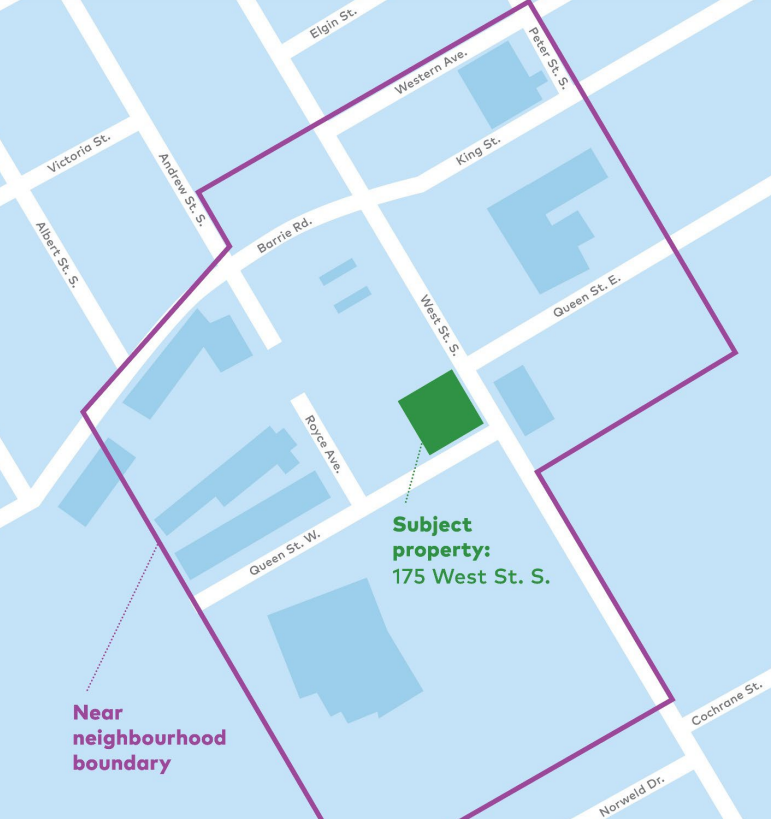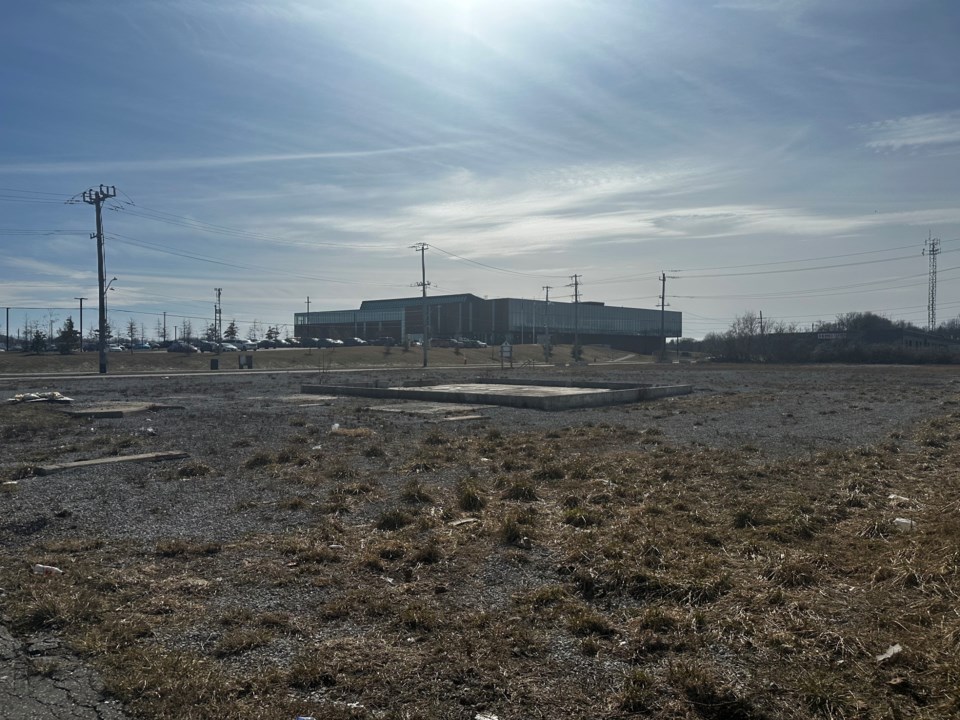Neighbours will have an opportunity to weigh in this week on plans to build a temporary, small modular home community for people without a place to live in Orillia.
A working group short-listed two sites for the modular homes: 175 West St. S. and 36 Peter St. S. Council then approved their recommendation and authorized plans to go forward at the West Street site on March 8.

The joint city/county project — called a supportive rapid rehousing program (SRRP) facility — is meant to transition the city’s unhoused population to permanent housing.
The temporary facility — composed of portable, modular units — will include sleeping rooms, shared washroom facilities with showers, a shared kitchen and laundry, and the potential for 24-hour staffing.
County officials say they expect the modular facilities to arrive at the end of March or early April, with minimal construction required onsite as the units are pre-built.
“However, grading, placement, lighting, parking accommodation, building connections and utility hookups are required and should be started (by) end of March. The extent of work will be dependent on the selected location,” said Brad Spiewak, the county’s director of social housing.
“We will have a more accurate timeline once the units have been shipped, but our goal is to have the building and program start operations in late April/early May.”
Since the location of the two short-listed sites was revealed, there have been many negative comments about the chosen sites on social media.
But residents and business owners have not yet had an opportunity to comment on the plans — until now.
“Together, city and county staff will begin to visit surrounding property owners within the neighbourhood of 175 West St. S. beginning on the afternoon of Thursday, March 21 to engage property owners, provide education and awareness materials about the SRRP project, and address any concerns,” notes the memo to council.
If property owners are not available that day, other arrangements will be attempted.
The memo from city staff notes that many of the neighbours within the neighbourhood boundary are businesses with traditional office hours.
The following is a list of the businesses and residences that will be contacted, according to the city memo.
- eCapital
- Home Hardware
- Canadian Tire Gas Bar
- Acres Auto Glass
- Greg the Mechanic
- MP Automotive
- The Smith Investigation Inc.
- Villosola Residential Condominiums (site superintendent only)
- McLean and Dickey Insurance
- Orillia Recreation Centre — City staff will provide in-person information sessions to the ORC customer service staff to raise awareness and education regarding the program being run by the county.
The memo notes the county is putting the finishing touches on the letter that will be handed out during the visits.
A leaflet answering frequently asked questions and addressing two common myths will also be provided during the visits. That information is provided below.
Frequently asked questions
What is the Supportive Rapid Rehousing Program (SRRP)?
A SRRP is a compassionate approach aimed at supporting individuals who are situationally homeless, which is the most common type of homelessness. Situational homelessness may be the result from many reasons beyond a person’s control, such as abuse or sudden loss of employment. This temporary program is designed to assist individuals to transition into permanent housing within 180 days. It is a supportive environment that provides full wrap-around services.
What type of services are provided to people through the SRRP?
The supports will include housing and daily meals with several coordinated and individualized services to help the program participant achieve positive housing outcomes.
The staff will provide support to the participants in the program by making appropriate referrals to employment, education, and health services. The program participants will be supported in all aspects of the move-in process to permanent housing including unit viewings, reviewing leases, furnishing apartments. Participants in the program will receive ongoing post-placement support for six months after securing permanent housing
Why are the City and County doing this? Don’t we have shelters for this?
This initiative in Orillia is expected to create space in the city’s existing shelter system, as the two programs work together to move people from situational homelessness to permanent housing through a system-wide approach.
Is this an emergency shelter?
No, this temporary program is designed to assist individuals, previously identified as situationally homeless, to transition into permanent housing within 180 days. It is a supportive environment that provides full wrap-around services.
Where will the temporary structure be located?
Following Orillia council’s authorization of 175 West St. S. and 66 Peter St. S. (in that priority ranking), city staff and consultants from the County of Simcoe have determined that there are no obstructions that would hold up their ability to obtain a building permit at the 175 West St. S. property. As such, the County of Simcoe is moving ahead with the project at that site.
Will people be living there permanently? How long will the temporary structure be in place?
No. The goal of this program is to transition people into their permanent housing within 180 days. The facility that you will see going up will be a temporary one, and is not a long-term, permanent structure. Council has authorized it to be placed at the site for up to five years.
Who will run the program?
Through an open request for proposal process, an operator will be selected by the County of Simcoe in March 2024 to manage this facility to run programs , prior to the facility opening in Orillia this year.
How many people will be helped through this SRRP in Orillia?
Once the facility has been placed and an operator has been selected, this program will support 10-20 participants within the first six months of the project and 20-40 participants within the first year, which could equal up to 100-200 participants over the project’s duration of five years
Do you have any experience with a similar program in the past? How well has it worked?
A similar temporary structure has been successfully utilized by the County in the City of Barrie on Rose Street. While being operated as a transitional housing program, the initiative in Barrie led to 18 clients (90 per cent of the participants) moving to permanent housing in a limited period, which is the ultimate goal of the program. The SRRP program is being implemented in four communities within Simcoe County to allow people to stay close to where they live and work, when they find themselves situationally homeless.
How do I find out more about this program?
To find out more about this project, please contact Janette McGee, City of Orillia Housing Coordinator, at 705-418-3575 or visit simcoe.ca/SRRP.
Two myths
Myth: Property values will go down.
Reality: Many studies on affordable housing conclude that there is no impact on property values. One study done in Toronto found that, “there was no evidence that the existence of the supportive housing buildings studied has negatively affected either property values or crime rates in the neighbourhood. Property values have increased and crime decreased in the period considered by the study.”
Myth: Crime will increase.
Reality: A Canadian study of 146 supportive housing sites concluded that “there was no statistically significant evidence that supportive housing led to increased rates of reported violent, property, criminal mischief, disorderly conduct or total crimes.” In fact, the future occupants of new affordable housing often already live in the neighbourhood.
--With files from Greg McGrath-Goudie
